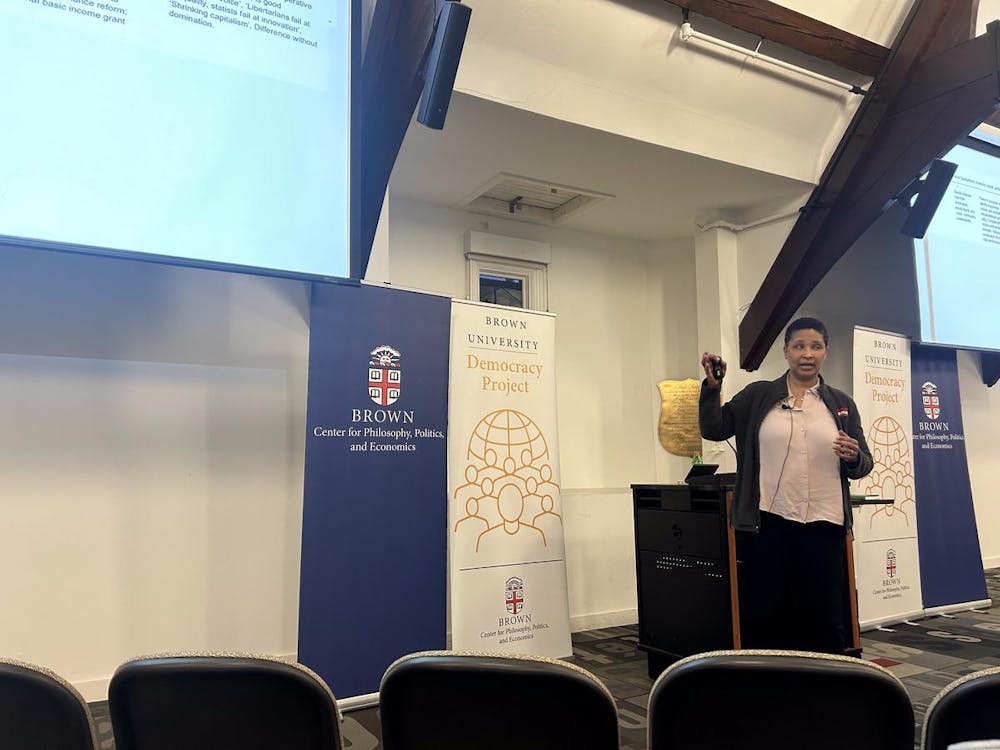Danielle Allen, a political scientist and professor at Harvard’s Kennedy School, spoke about her new book, “Justice by Means of Democracy” at a lecture hosted by Brown’s Democracy Project on Thursday. She also discussed social differences and the possibility of a more equitable economy.
Allen was introduced by Juliet Hooker, a professor of political science and one of the directors of the Democracy Project, who said that “one of the goals of the (project) is to create global spaces of reflection and action for those who want to make our political communities more truly inclusive.” Hooker hoped Allen’s talk would do just that, she said.
Throughout her lecture, Allen emphasized the need to prioritize both positive liberties — the guarantee of certain basic rights, such as speech and thought — and negative liberties — the freedom from impositions such as unlawful imprisonment or excessive surveillance — without letting either overpower the other. Allen argued that American democracy has prioritized negative liberties over positive ones for too long, resulting in those with power “not listening to the people who are affected by the policies” being enacted.
“Human beings are creatures who need to chart their own courses in life and thrive,” she said, adding that such autonomy “requires participation in a civil society.”
Instead, she suggested “treating both sets of liberties as non-sacrificable” but emphasized that doing so “requires supporting the emergence of difference while blocking its articulation with domination” — in other words, she said, accepting “difference without domination.”
This idea permeated throughout the lecture with her encouraging tenants of social connectedness over social cohesion, power sharing across differences and a polypolitanism — a transition from a homogenous national voice to overlapping, diverse voices.
She described this newfound system as an “egalitarian constitutional participatory democracy,” which she believes could provide citizens with more say in societal decision-making beyond simple majority vote.
In an email to The Herald, Allen wrote that “same day voter registration” and “prohibitions on foreign-influenced corporate political expenditures” are some of the policies that can “restore voice and choice to the American people.” She also praised Alaska’s election system, which relies on nonpartisan primaries and ranked-choice voting.
With a likely rematch between Donald Trump and current President Joe Biden in the 2024 presidential election, many young voters have expressed apathy over the power of their ballot in a civil society. Allen wrote to The Herald that this sentiment is not uncommon, as “the majority of the electorate is frustrated with the choices that we have this year.”
“Yet the paradox is that if we want to break through to healthier politics, the way we get there is high turnout from a broad and diverse electorate that reminds politicians that they are accountable to us, we the people,” Allen wrote. “Without turnout, we don’t have robust competition in our elections. Without competition, we don’t have accountability … So it’s a really important contribution to the social good to get out there and vote, even if you don’t feel great about the choice.”
One student attendee, Maya Nunez GS, a PhD student in the political science department, thanked the Democracy Project for “creating a forum” where such issues could be discussed. “I’m definitely going to ask all my professors that I work with so many more questions.”

Owen Dahlkamp is the managing editor of newsroom on The Herald's 135th Editorial Board, overseeing the paper's news operations. Hailing from San Diego, CA, he is concentrating in Political Science and Cognitive Neuroscience with an interest in data analytics. In his free time, you can find him making spreadsheets at Coffee Exchange.





